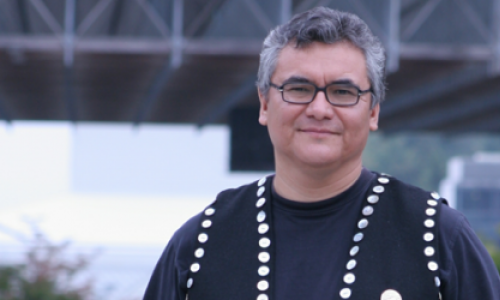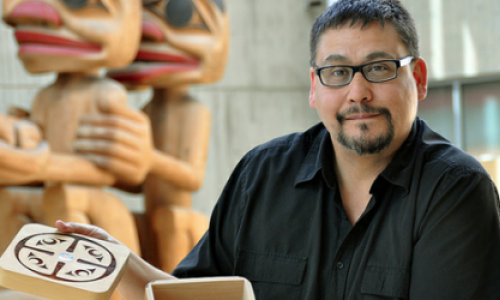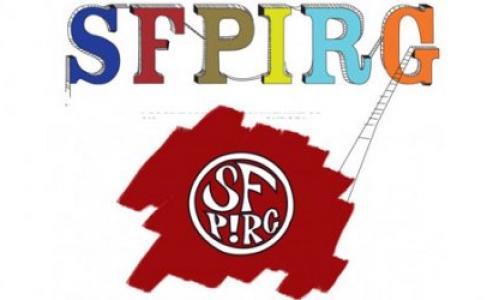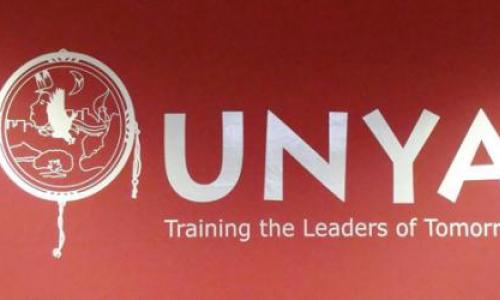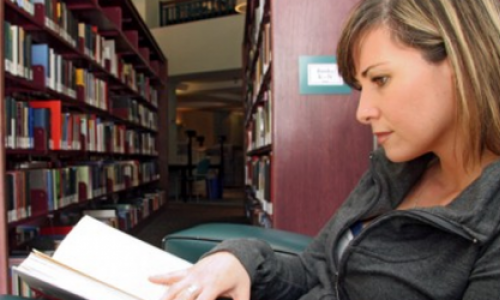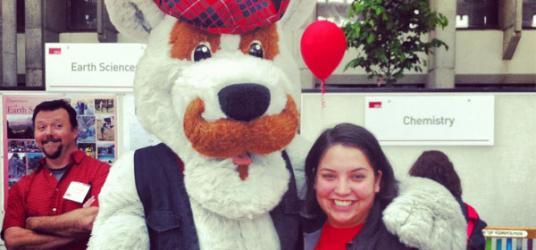
There are many people talking about what we can do as as society to increase the number of Indigenous students in post secondary schools. And then there are other people, who make changes that can directly effect the lives of those potential Indigenous students. Here at SFU we have someone who is taking action and through implementation of her ideas changing the face of Indigenous recruitment. Angela Semple is her name.
When I arrived at SFU I entered as mature student oblivious to the opportunities and sense of community SFU had to offer me as a Metis student. I attended Orientation and learned all about the school facilities. The element that was missing from that orientation was the introduction to the Indigenous family and network that I would be engaging with throughout my degree. There was nothing mentioned about the Indigenous student center, or Office for Aboriginal Peoples. They certainly did not mention the First Nations Student Association. Fortunately I met another Indigenous student in one of my classes that invited me to the Welcome BBQ for Indigenous students. Here I was introduced to Indigenous SFU, which would become my support system, and my family.
I often wonder what would have happened if I was not majoring in First Nations Studies? If I was in a Faculty that was not full of other Indigenous students, would I have found the connections I have made in the first two years of school? Or would I have been isolated and feel alone in a world where I was a minority?

Seeing this as an opportunity, but having no resources to combat it I searched the school trying to gain assistance to help in Indigenizing the Orientation process. Although quick to listen the obstacles to create an Indigenous Orientation seemed too difficult for those in the position to help at the time. What could we do? We had to do something.
We were able to create an afternoon during free time of the SFU orientation to have a table full of Indigenous students and members of the First Nations Student Association, an initiative which was also featured on the OLC last year.
But this was not enough and thankfully the recruitment department has hired a former SFU graduate and FNSA Board member, Angela Semple. Who through her own tenacity and determination was able to implement a program that would elevate many of issues with the lack of representation in the Orientation here at SFU and give Indigenous students the connections they need to succeed here.
Here is my interview with the new Associate Indigenous Student Recruiter Angela Semple on the new and exciting initiative the Indigenous Student Ambassadors added to SFU’s Indigenous Recruitment Team.
Why did you feel the creation of Indigenous Student Ambassadors at SFU were necessary?

I was hired on at SFU in order to support Jennie Blankinship as an Indigenous Student Recruiter. Jennie had been on her own for the past 5 years, spending the majority of her time recruiting on the road in schools and communities. When I was hired, I was able to look at what kind of experience our prospective students had when they actually come on to our campus in addition to the work we do all over BC in communities and schools.
One of my first activities was going on a campus tour. I noticed then that none of our Indigenous resources were discussed during these tours. To me (and later, to our ISAs), this was a glaring example of the silencing and erasure of Indigenous peoples that happens consistently on a larger scale. Of course, I do not blame anyone for this missing piece, especially because as soon as I discussed my concerns with Campus Tours they were immediately open and willing to learn about and share more Indigenous content.
I was then faced with wondering how to make the necessary changes. I realized that the more I thought about it, the more that I felt we were missing an Indigenous student voice within Recruitment. At this time I had met two International Student Ambassadors who were working for Recruitment. These students support our office and provide input on International student experience, so it seemed natural to expand our own department to include Indigenous Student Ambassadors in order to further Indigenous representation on campus.
What exactly do the Indigenous Student Ambassadors introduce to the students and why is that important to prospective students?
As this was a pilot project, our main focus for our first semester (Spring 2013) was campus tours. We are hoping that funding will be available in the fall in order to expand the areas in which the ISA's are involved, but for now I'll explain how our first semester went.
Currently our process begins when an Indigenous student group contacts either myself, Jennie Blankinship, the ISC, and/or Campus Tours in order to book a trip to our institution. As the coordinator of the ISA program, I eventually receive all these requests, and we typically schedule in at least a 1 1/2 hour tour. Often we have a 30 minute presentation before or after, and in one instance we've had a full day tour with lunch, presentations, and a faculty lecture.
The main thing for us was that campus tours have been doing a fantastic job... for the audience it serves… The typical student who comes for a family, school, or group tour is deciding which university to go to, so they want to know all about the amenities here, and what we can offer over other schools. What I have found in my work with Indigenous students (and having grown up as one myself) is that our Indigenous high school population often does not plan on going to post-secondary at all. Many of them don't see it as an achievable goal, which then makes finishing high school less of a goal. Also, many Indigenous parents of our high school students have not gone to university either, which creates a barrier for the students--having parents who are familiar with the experience and language of university helps make it less of a scary place.

All that being said, we realized that for Indigenous student groups, we need to inspire and empower them through our tours. We need to show them current Indigenous students who had made it here, and who are succeeding. We also want to show them that university is fun, and we wanted to focus more on Indigenous resources than getting the whole picture of the university (they can see departments etc. once they apply and get in!) So, our ISA's now join in on the tours for Indigenous student groups. They talk to the students to find out their interests, and they share a more personal experience of the university with our prospective students. Also, they get to show them things like the FNSA (which is only accessible if you are a member, which our ISA's are) and they talk about using campus resources as Indigenous students. We get to create a sense of community with these students before they've even applied. Our prospective Indigenous students need to be able to envision themselves here, and through meetings with the ISA's we all agreed that having a visible Indigenous Student representation for visiting groups is the best way to help them do this.
One other really great product of this initiative was that Campus Tours invited myself and the ISA's to their Tour Guide/Ambassador training session on Saturday, May 11, in order to help educate ALL Student Central staff on the importance of pointing out Indigenous Resources on campus for every tour. In essence, this combats the earlier mentioned "silencing and erasure" of Indigenous presence that we found was happening within the tours. In fact, we are now introducing tours by acknowledging that SFU is on unceded Coast Salish territory which is an incredibly important step. We also got to dispel some myths and stereotypes to a wonderful group of students who were eager to learn more and are looking forward to sharing this information.
What do you feel this program has to offer the prospective students?
To summarize my long answer above, I think it offers them a chance at seeing students like themselves actually coming and succeeding at university, which, in turn, helps them to imagine coming here. They are also offered a sense of the Indigenous community on campus, which can be very helpful for students afraid of leaving their own small communities for the big city/university.
Can you give an example of a tour that you have already done and name the school and organization?

Our largest event to date was the Burnaby District Aboriginal School Visit on April 5, 2013. We had 60 students and 7 chaperones come for a full day (10am-2pm). We started out with an introduction and welcome by Elder Maureen and also gave the students a sample lecture from FNST/English Professor, Dr. Deanna Reder on the history of Indigenous representations in texbooks. We then had a tour, lunch, and a student-panel run by our ISAs. This was a great event because our ISAs were able to answer any questions that arose from the group, and also to share some great examples of what being an Indigenous student in university is like.
I also had a chance to ask a couple of the newly hired Indigenous Student Ambassadors to tell us about their involvement and how they feel it is going.
Loryn Blower Indigenous Student Ambassador
I am Metis, with Cree and Lakota ancestry. I was born in Vancouver, BC. and lived in the Bahamas for ten years with my family - transitioning back to Canada when I was 20 was quite the learning curve. Before attending SFU I took two years of Environmental Studies at Douglas College. These multiple academic and personal transitions have encouraged me to pick myself up from my mistakes and be wary of post-secondary pit-falls. Many University concepts are not understood by the first year student when they begin school! By working as an Indigenous Ambassador I have been able to promote student success at the university, even before the student makes the big decision to attend. By simply letting potential undergrads know of the services available here for Indigenous students, it may be the entire deciding factor for continuing education after high school. This helps to foster a sense of community even before the student arrives.
Rhian Quarry, Indigenous Student Ambassador
As an SFU Indigenous Student Ambassador, I have tried to find ways in which we can incorporate Indigenous representation in the campus tours. By identifying the resources for Indigenous students at SFU, we not only help those needing the resources but also inform all potential students of the Indigenous presence on campus. When an Indigenous group books a tour at SFU, I will come and tag along on the tour.
Talking with the students during the tour helps to find out what their interests are and I try to encourage them to come to SFU by telling them of all the different opportunities they have. After each tour I always feel that there just wasn’t enough time to get to know the students. Later in the tour I will have gotten to know them well enough that they will be comfortable asking questions about school, but I feel more time is needed to really answer all of their questions.
One tour I enjoyed the most was with a group of grade 5-7 students where we were able to show the younger students what opportunities there are in the future. It is still very early in the program and each tour seems to get better and better as we overcome any problems.
Each of the Indigenous Student Ambassador’s come from different backgrounds and have different fields of study, so that really helps to provide insight to the students about the opportunities at SFU. I also think that by having the Indigenous Student Ambassadors joining the campus tours, we are also educating the tour guides of the importance of identifying Indigenous resources. Many of the tour guides I have met are all very eager to learn about them and I hope in the future will mention them on their tours.
Alissa Derrick, Indigenous Student Ambassador
I am from the Wet’suwet’en Nation located in Moircetown, British Columbia. I am a 4th year Arts Major; with a double minor in Criminology and First Nations Studies, with an intention of receiving my Master in Public Policy at Simon Fraser University. At this moment, I have been hired through recruitment as their Indigenous Ambassador. Through this role, I provide tour to new Aboriginal students and serve as a mentor. The mentorship role has varied throughout the position, often with students asking endless questions. The questions range from scholarship supports, to life experience, to the experience of being at the university.
This job position was taken to complement the volunteering and work experience I do among other Aboriginal organizations. I am aware of the complexities that Aboriginal communities encounter and the difficulties Aboriginal students face entering post-secondary. Therefore, it seemed like a suitable opportunity to become involved in.
The experience of working on campus and volunteering aims to achieve two goals. The first is to strengthen a sense of community in the university and to receive experience leading to a future career as an Aboriginal Community Liaison Officer (ACLO). This job aims to enhance the reintegration potential of aboriginal offenders into communities safely. The positions responsibilities are among many, with some including working with the Institutional Parole Officers (IPO's), Elders, Aboriginal Liaison Officers (ALO's), Aboriginal Community Development Officers (ACDO's), and other case management team members to identify high risk and high need aboriginal inmates with plans for release to communities.
I enjoy volunteering among the university community and the Aboriginal community. I believe the Aboriginal students and the SFU community recognize exciting changes happening. These changes lead to students, such as myself becoming more involved with the university. For the 2012-2013 academic year, these are a few of the organization or committee’s I have chosen to volunteer with:
-
Metro Vancouver Aboriginal Executive Council
-
First Nation Student Association
-
North American Indigenous Games Badminton Committee
-
Knowledgeable Aboriginal Youth Association
-
SFU Aboriginal Advisory Committee
-
FNSA Aboriginal Criminology Series
-
The File Folder Project
-
The Federation Youth In Care Network
-
Vancouver Aboriginal Friendship Centre
-
Aboriginal Youth Internship Program Selection Committee
-
Unified Aboriginal Youth Collective Forum
These organization are integral for the changes among Aboriginal people, and I continue to enjoy the experience that each continue to bring.
Christina Coolidge, Indigenous Student Ambassador
The OLC’s very own blogger is also a Indigenous Student Ambassador. Check out her blog about her experiences with this new and exciting program to help Indigenous potential students.
I look forward to hearing more from this amazing team and meeting the students they are able to help transition into SFU.
If you would like a tour of SFU contact our Recruitment team.









